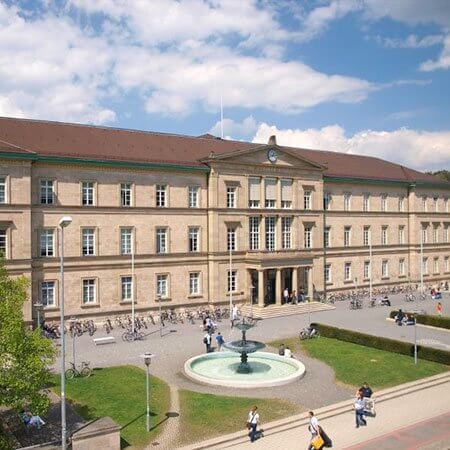Dysgerminoma refers to malignant ovarian tumors that develop in young women. You can undergo your treatment for this disease in Germany. The operation will be as sparing as possible so that the possibility of pregnancy remains in the future. Chemotherapy is usually required after surgery to reduce the risk of recurrence.
Standard treatment includes surgery and chemotherapy. Very early stages of the disease can be treated without chemotherapy, but careful medical supervision is required. Radiation therapy is used less often to suppress metastases or in case of dysgerminoma recurrence.
You can undergo your treatment in one of the following hospitals: University Hospital Tuebingen, Leverkusen Clinic, or University Hospital Rechts der Isar in Munich.
When making your appointment through Booking Health, you will receive optimal medical care and services for organizing your trip abroad. The company's employees will select a specialized German clinic for you, help you to apply for a visa and quickly get to a doctor, and tell you about possible treatment methods. Booking Health will take care of the translation of your medical documents and control the invoices from the clinic. A personal medical coordinator will help you with any questions that may arise.
What is a dysgerminoma?
Epithelial and non-epithelial malignant tumors can develop in a woman's ovaries. Epithelial ones are called cancer. Non-epithelial tumors are mainly represented by germ cell and stromal tumors. Other types of neoplasms are very rare.
In turn, germ cell tumors are of two types:
- dysgerminomas;
- non-dysgerminoma tumors (yolk sac tumors, embryonic cancer, choriocarcinoma, polyembryoma, and various combinations thereof).
A dysgerminoma is the most common germ cell tumor. This is always malignant but usually non-aggressive. The neoplasms differ in their degree of differentiation: the higher it is, the better the prognosis. Low-grade tumors account for only 30% of cases.
Surgical treatment
The mainstay of treatment is tumor removal surgery, which can be performed at all stages of the disease.
An adnexectomy is the most sparing operation, which can be performed at stage 1A. Doctors remove the ovary and the fallopian tube on the affected side. The second ovary with its fallopian tube and uterus is preserved, which allows a woman to become pregnant in the future. This is an essential advantage of the operation because most patients with dysgerminoma are young women. After such an operation, chemotherapy is not required. However, a dysgerminoma can recur, and, in this case, doctors should provide timely medical care. A woman will be regularly examined for timely detection of relapse.
In 10% of cases, a dysgerminoma affects two ovaries simultaneously. In such cases, doctors usually remove the uterus with its appendages. In women with reproductive plans, removing two ovaries with the preservation of the uterus may be considered. In this case, a pregnancy following dysgerminoma treatment can be achieved with the help of in vitro fertilization.
A hysterectomy is the main surgical procedure for dysgerminoma treatment. This intervention provides the most reliable outcomes. Hysterectomy involves the removal of the uterus with its appendages. This operation is performed even in the early stages if a woman is not interested in maintaining her reproductive function.
A cytoreductive operation is carried out if the tumor has spread beyond the ovary. Doctors remove the uterus with its appendages and all tumor foci in the abdominal cavity larger than 1 mm. Such cytoreduction is called complete. If this operation fails, doctors try to remove at least tumors larger than 1 cm. This cytoreduction is called optimal. Its results are worse, but the survival of patients is higher than when using only chemotherapy, without surgery.
The cost of surgery for germ cell tumors of the ovary (dysgerminoma) ranges from 6,500 EUR to 10,000 EUR.
Chemotherapy
Chemotherapy is considered the second most important treatment of germ cell tumors of the ovary in Germany. Most women receive it, except when the disease is detected very early.
Three cycles of chemotherapy are usually required. Doctors use a combination of PEB or BEP. Dysgerminomas are very sensitive to chemotherapy drugs, so doctors can use more sparing regimens to reduce the risk of developing severe side effects. They prescribe only two drugs instead of three without compromising the final outcome of the treatment.
As a rule, a standard chemotherapy regimen is prescribed as a first-line treatment. However, if it doesn't work, or if the tumor recurs after its initial treatment within a short time, doctors may consider other drugs. The cost of chemotherapy for germ cell tumors of the ovary (dysgerminoma) ranges from 5,900 EUR to 13,400 EUR.
Radiotherapy
Radiation therapy is rarely used for dysgerminoma treatment. Although this tumor is sensitive to radiation, surgery and chemotherapy are more effective methods, and doctors prefer them.
Radiation therapy for dysgerminoma can sometimes be used in the following cases:
- in a tumor recurrence (but the treatment of a dysgerminoma, which has recurred after its therapy, more often involves the use of chemotherapy or a repeated operation);
- to suppress distant metastases, for example, in the spine.
The cost of radiation therapy for germ cell tumors of the ovary (dysgerminoma) ranges from 15,600 EUR to 30,900 EUR.
You are welcome to use the Booking Health service to undergo your dysgerminoma diagnostics, treatment, and rehabilitation in one of the German hospitals. The website presents the best medical centers in Germany. Here you can see and compare prices for treatment in these healthcare facilities. When making your treatment appointment through the Booking Health service, a favorable cost is associated with the absence of overpricing for foreign patients. Please leave your request on the website if you want to undergo your treatment abroad. Our company's specialist will contact you as soon as possible and help you to choose clinics in Germany. We will organize your trip abroad so that you can fully focus on restoring your health.
Authors:
The article was edited by medical experts, board certified doctors Dr. Nadezhda Ivanisova and Dr. Sergey Pashchenko. For the treatment of the conditions referred to in the article, you must consult a doctor; the information in the article is not intended for self-medication!
Sources:
National Library of Medicine
Cancer Research Institute
European Society of Gynaecological Oncology - ESGO




















